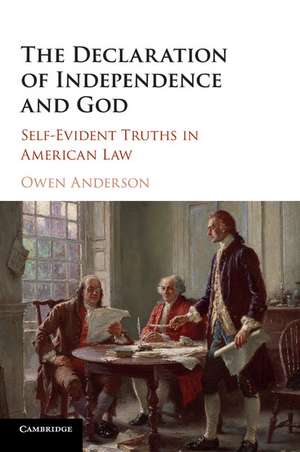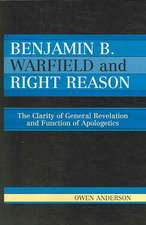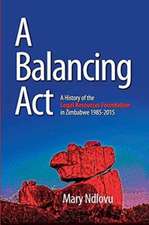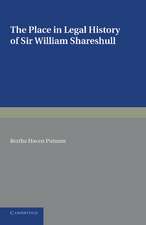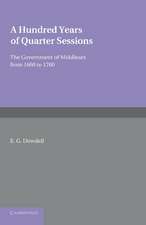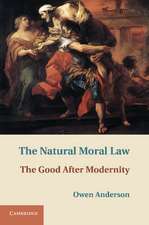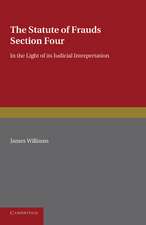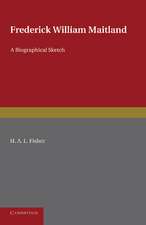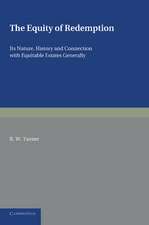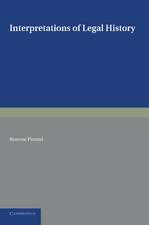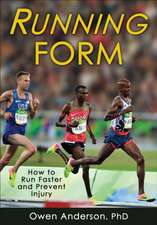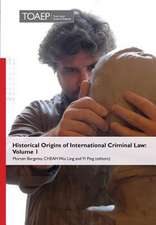The Declaration of Independence and God: Self-Evident Truths in American Law
Autor Owen Andersonen Limba Engleză Paperback – 15 mar 2017
| Toate formatele și edițiile | Preț | Express |
|---|---|---|
| Paperback (1) | 281.12 lei 43-57 zile | |
| Cambridge University Press – 15 mar 2017 | 281.12 lei 43-57 zile | |
| Hardback (1) | 722.43 lei 43-57 zile | |
| Cambridge University Press – 17 sep 2015 | 722.43 lei 43-57 zile |
Preț: 281.12 lei
Nou
Puncte Express: 422
Preț estimativ în valută:
53.79€ • 56.31$ • 44.77£
53.79€ • 56.31$ • 44.77£
Carte tipărită la comandă
Livrare economică 31 martie-14 aprilie
Preluare comenzi: 021 569.72.76
Specificații
ISBN-13: 9781107459045
ISBN-10: 1107459044
Pagini: 216
Dimensiuni: 153 x 230 x 13 mm
Greutate: 0.3 kg
Editura: Cambridge University Press
Colecția Cambridge University Press
Locul publicării:New York, United States
ISBN-10: 1107459044
Pagini: 216
Dimensiuni: 153 x 230 x 13 mm
Greutate: 0.3 kg
Editura: Cambridge University Press
Colecția Cambridge University Press
Locul publicării:New York, United States
Cuprins
Introduction; 1. Thomas Jefferson and Thomas Paine; 2. The reformed influence on common sense philosophy; 3. Common sense and self-evident in law; 4. Intuition and the self-evident in law; 5. Naturalism, Darwinism, the self-evident, and law; 6. Revivalism, new religious movements, and law; 7. Liberal theology and legal transformations; 8. Secular and religious goods in the twentieth century; Conclusion.
Recenzii
'This volume deepens our understanding of the foundations of our basic beliefs by analyzing the metaphysical and ethical foundations of the Declaration of Independence. Scholars and citizens alike will benefit from this subtle inquiry into the philosophical and theological underpinnings of that text. One might have thought there was nothing new and persuasive to say about the Declaration, but Anderson's excellent volume proves that wrong.' G. Alan Tarr, Board of Governors Professor of Political Science, Rutgers University, New Jersey
'Anderson's book is a fast-paced, enthralling tour through the history of American religious thought from the Puritans to the present day, with the varying understandings of the preamble to the Declaration of Independence as the unifying thread. Anderson skillfully ties together the fundamental questions in epistemology ('we hold these truths to be self-evident'), metaphysics ('created equal'), political theory ('inalienable rights'), and ethics ('the pursuit of happiness'), as seen through the lens of America's evolving theological consensus.' Robert Koons, Professor of Philosophy, University of Texas, Austin
'Owen Anderson's The Declaration of Independence and God weaves a fine narrative. Political thinkers, philosophers and theologians such as Thomas Jefferson, Thomas Paine, Ralph Waldo Emerson, Paul Tillich, Charles Finney and John Cobb, to name only a few, are highlighted as he guides readers through key patterns of American thought in its intertwined religious and legal history. Anderson illuminates how philosophical assumptions, in particular skepticism, have informed the Supreme Court as it has decided major cases involving religious liberty and abortion. Throughout the book he uses the language of the Declaration of Independence, 'America's creed' as he calls it, to investigate its metaphysics and ethics and unpack the meaning of 'God' and 'self-evident'. One of the book's provocative contributions is to chart a course between Christian and secular interpretations of the Declaration by considering seriously the common Enlightenment ground of natural religion from which it springs.' Paul Kerry, Associate Visiting Research Fellow, Rothermere American Institute, University of Oxford and Associate Professor of History, Brigham Young University, Utah
'Anderson's book concludes with an appeal for renewed attention to natural religion as a step toward regaining the political consensus enjoyed by earlier generations. … Whatever the future holds, however, Anderson's book helps us understand the present and its roots in the past.' Randy Beck, Journal of Church and State
'Anderson's book is a fast-paced, enthralling tour through the history of American religious thought from the Puritans to the present day, with the varying understandings of the preamble to the Declaration of Independence as the unifying thread. Anderson skillfully ties together the fundamental questions in epistemology ('we hold these truths to be self-evident'), metaphysics ('created equal'), political theory ('inalienable rights'), and ethics ('the pursuit of happiness'), as seen through the lens of America's evolving theological consensus.' Robert Koons, Professor of Philosophy, University of Texas, Austin
'Owen Anderson's The Declaration of Independence and God weaves a fine narrative. Political thinkers, philosophers and theologians such as Thomas Jefferson, Thomas Paine, Ralph Waldo Emerson, Paul Tillich, Charles Finney and John Cobb, to name only a few, are highlighted as he guides readers through key patterns of American thought in its intertwined religious and legal history. Anderson illuminates how philosophical assumptions, in particular skepticism, have informed the Supreme Court as it has decided major cases involving religious liberty and abortion. Throughout the book he uses the language of the Declaration of Independence, 'America's creed' as he calls it, to investigate its metaphysics and ethics and unpack the meaning of 'God' and 'self-evident'. One of the book's provocative contributions is to chart a course between Christian and secular interpretations of the Declaration by considering seriously the common Enlightenment ground of natural religion from which it springs.' Paul Kerry, Associate Visiting Research Fellow, Rothermere American Institute, University of Oxford and Associate Professor of History, Brigham Young University, Utah
'Anderson's book concludes with an appeal for renewed attention to natural religion as a step toward regaining the political consensus enjoyed by earlier generations. … Whatever the future holds, however, Anderson's book helps us understand the present and its roots in the past.' Randy Beck, Journal of Church and State
Descriere
This book studies the concept of a 'self-evident' God in American legal thought from the Revolution to the present.
